Text
they’re gonna make you obey their orders.
do you want to be loved?
obey.
each group, each gathering has their own orders.
we follow the rules. we always follow the rules.
you’re a rebel? you are not an exception. they dictate how you can rebel, you will follow their orders. you will give them what they want while thinking it’ll make you better, pure, more ‘’special’’ then them.
you want to be loved, so you follow someones orders.
output equals input. you’re praised for being self-reflected, but you’re not ever, ever thinking. you’re just repeating. they would never want you to think.
but you are not a victim. you are them. you are a part of them. you follow orders as you repeat them to others, you ‘’teach’’, you ‘’help’’, you ‘’educate’’
you pick an aesthetic, you pick rules for yourself, you pick this and that, you get your personality from others liking.
you’re pathetic.
24 notes
·
View notes
Text
i’m confused with the open publics view on abuse.
most people acknowledge that child abuse is something that is very much real and happening, bu why dont they ever remember their own kids and think ‘’oh wait if hitting children wrong then i did wrong to my child’’
WHERE IS YOUR DAMN BRAIN
0 notes
Text
you're allowed to wake up one day & change all that you are - especially if you're tired of social masking .
talk less . be blunter & more straightforward . find the little odd & eccentric bit if you that you Like & stop hiding them . wear what you want to . get comfortable in your own skin again .
we deserve to be comfortable in our skin , too ; & trust me . after a while of doing it , those around you [ that actually matter ] won't challenge who you are as much .
54 notes
·
View notes
Text
rb to save
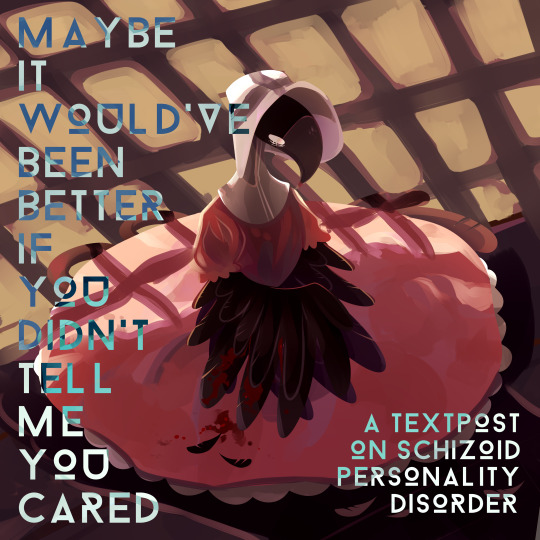
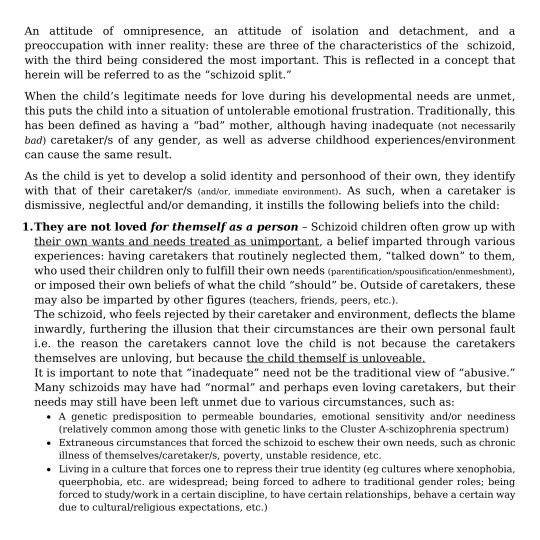
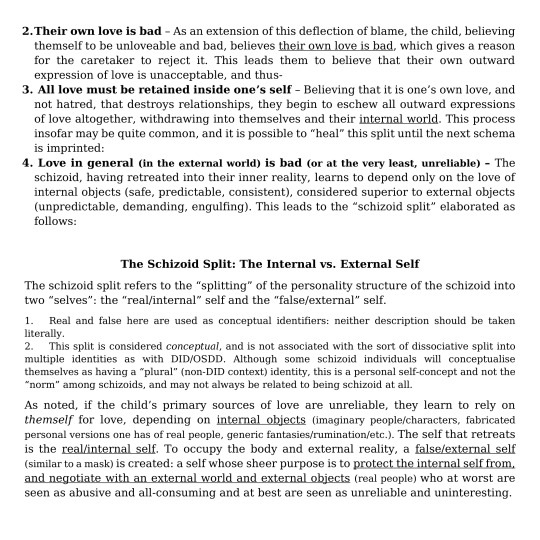
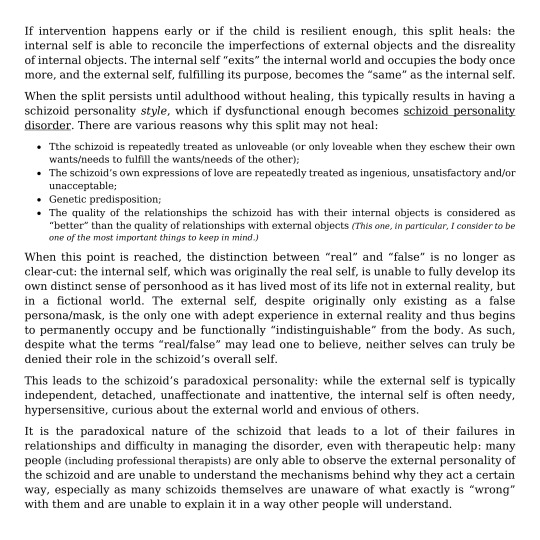

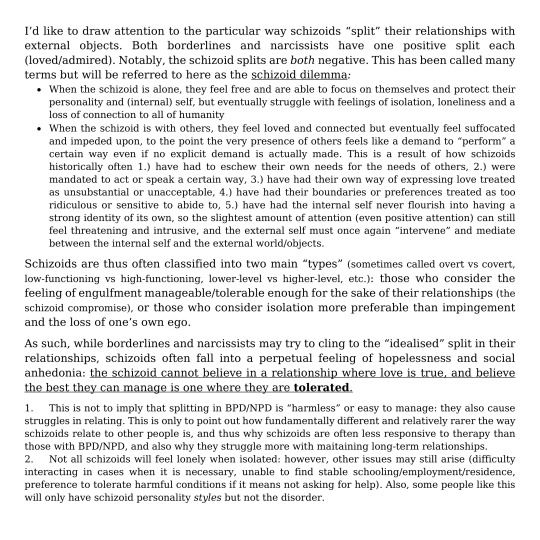
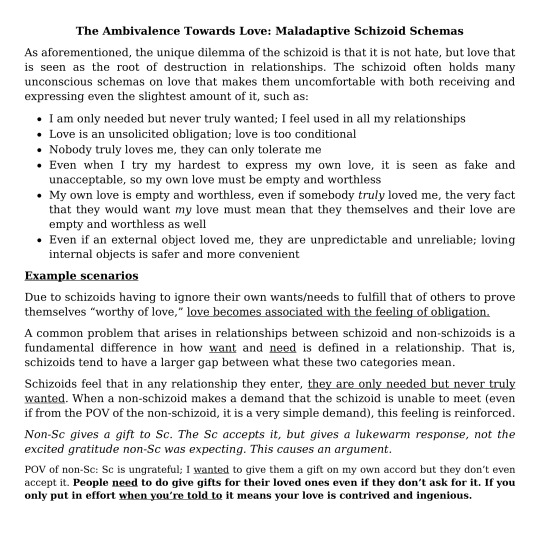

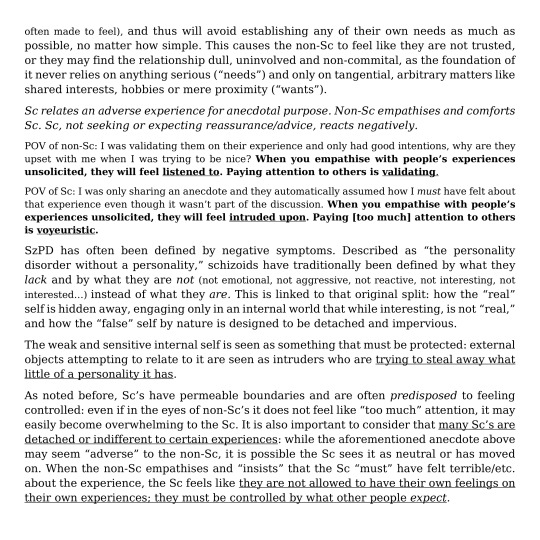

/* Old document. This was originally formatted for Instagram, hence the square pages + nine page limit [ +1 for the cover ] so do forgive if the font is a bit small or some of the explanations had to be condensed!
My goal was an overview of ScPD that delved deeper than just surface-level behaviours, while still being "short and sweet" enough to be understandable even without having read a lot of schizoid literature. There are some comparisons to BPD and NPD to give a clearer understanding of how ScPD splitting works by comparison, but BPD/NPD are not the primary focus of the document. Title was taken from this paper.
The character on the cover is my schizoid webcomic character, Jacques. He isn't really relevant to the post, I just used an image as a cover so it wouldn't look weird on the preview on Instagram.
As always, these are mere frameworks and each individual can have their own experiences that are not 1:1 as described here.
Anything that needs further clarification or correction, please message or append in a reblog!
Transcript and additional references below the readmore. */
An attitude of omnipresence, an attitude of isolation and detachment, and a preoccupation with inner reality: these are three of the characteristics of the schizoid, with the third being considered the most important. This is reflected in a concept that herein will be referred to as the “schizoid split.”
When the child’s legitimate needs for love during his developmental needs are unmet, this puts the child into a situation of untolerable emotional frustration. Traditionally, this has been defined as having a “bad” mother, although having inadequate (not necessarily bad) caretaker/s of any gender, as well as adverse childhood experiences/environment can cause the same result.
As the child is yet to develop a solid identity and personhood of their own, they identify with that of their caretaker/s (and/or, immediate environment). As such, when a caretaker is dismissive, neglectful and/or demanding, it instills the following beliefs into the child:
1. They are not loved for themself as a person – Schizoid children often grow up with their own wants and needs treated as unimportant, a belief imparted through various experiences: having caretakers that routinely neglected them, “talked down” to them, who used their children only to fulfill their own needs (parentification/spousification/enmeshment), or imposed their own beliefs of what the child “should” be. Outside of caretakers, these may also be imparted by other figures (teachers, friends, peers, etc.).
The schizoid, who feels rejected by their caretaker and environment, deflects the blame inwardly, furthering the illusion that their circumstances are their own personal fault i.e. the reason the caretakers cannot love the child is not because the caretakers themselves are unloving, but because the child themself is unloveable.
It is important to note that “inadequate” need not be the traditional view of “abusive.” Many schizoids may have had “normal” and perhaps even loving caretakers, but their needs may still have been left unmet due to various circumstances, such as:
A genetic predisposition to permeable boundaries, emotional sensitivity and/or neediness (relatively common among those with genetic links to the Cluster A-schizophrenia spectrum)
Extraneous circumstances that forced the schizoid to eschew their own needs, such as chronic illness of themselves/caretaker/s, poverty, unstable residence, etc.
Living in a culture that forces one to repress their true identity (eg cultures where xenophobia, queerphobia, etc. are widespread; being forced to adhere to traditional gender roles; being forced to study/work in a certain discipline, to have certain relationships, behave a certain way due to cultural/religious expectations, etc.)
2. Their own love is bad – As an extension of this deflection of blame, the child, believing themself to be unloveable and bad, believes their own love is bad, which gives a reason for the caretaker to reject it. This leads them to believe that their own outward expression of love is unacceptable, and thus-
3. All love must be retained inside one’s self – Believing that it is one’s own love, and not hatred, that destroys relationships, they begin to eschew all outward expressions of love altogether, withdrawing into themselves and their internal world. This process insofar may be quite common, and it is possible to “heal” this split until the next schema is imprinted:
4. Love in general (in the external world) is bad (or at the very least, unreliable) – The schizoid, having retreated into their inner reality, learns to depend only on the love of internal objects (safe, predictable, consistent), considered superior to external objects (unpredictable, demanding, engulfing). This leads to the “schizoid split” elaborated as follows:
The Schizoid Split: The Internal vs. External Self
The schizoid split refers to the “splitting” of the personality structure of the schizoid into two “selves”: the “real/internal” self and the “false/external” self.
Real and false here are used as conceptual identifiers: neither description should be taken literally.
This split is considered conceptual, and is not associated with the sort of dissociative split into multiple identities as with DID/OSDD. Although some schizoid individuals will conceptualise themselves as having a “plural” (non-DID context) identity, this is a personal self-concept and not the “norm” among schizoids, and may not always be related to being schizoid at all.
As noted, if the child’s primary sources of love are unreliable, they learn to rely on themself for love, depending on internal objects (imaginary people/characters, fabricated personal versions one has of real people, generic fantasies/rumination/etc.). The self that retreats is the real/internal self. To occupy the body and external reality, a false/external self (similar to a mask) is created: a self whose sheer purpose is to protect the internal self from, and negotiate with an external world and external objects (real people) who at worst are seen as abusive and all-consuming and at best are seen as unreliable and uninteresting.
If intervention happens early or if the child is resilient enough, this split heals: the internal self is able to reconcile the imperfections of external objects and the disreality of internal objects. The internal self “exits” the internal world and occupies the body once more, and the external self, fulfilling its purpose, becomes the “same” as the internal self.
When the split persists until adulthood without healing, this typically results in having a schizoid personality style, which if dysfunctional enough becomes schizoid personality disorder. There are various reasons why this split may not heal:
The schizoid is repeatedly treated as unloveable (or only loveable when they eschew their own wants/needs to fulfill the wants/needs of the other);
The schizoid’s own expressions of love are repeatedly treated as ingenious, unsatisfactory and/or unacceptable;
Genetic predisposition;
The quality of the relationships the schizoid has with their internal objects is considered as “better” than the quality of relationships with external objects (This one, in particular, I consider to be one of the most important things to keep in mind.)
When this point is reached, the distinction between “real” and “false” is no longer as clear-cut: the internal self, which was originally the real self, is unable to fully develop its own distinct sense of personhood as it has lived most of its life not in external reality, but in a fictional world. The external self, despite originally only existing as a false persona/mask, is the only one with adept experience in external reality and thus begins to permanently occupy and be functionally “indistinguishable” from the body. As such, despite what the terms “real/false” may lead one to believe, neither selves can truly be denied their role in the schizoid’s overall self.
This leads to the schizoid’s paradoxical personality: while the external self is typically independent, detached, unaffectionate and inattentive, the internal self is often needy, hypersensitive, curious about the external world and envious of others.
It is the paradoxical nature of the schizoid that leads to a lot of their failures in relationships and difficulty in managing the disorder, even with therapeutic help: many people (including professional therapists) are only able to observe the external personality of the schizoid and are unable to understand the mechanisms behind why they act a certain way, especially as many schizoids themselves are unaware of what exactly is “wrong” with them and are unable to explain it in a way other people will understand.
Core Sensitivities/Splitting and the Schizoid Dilemma
“Splitting” in the sense of black-and-white thinking (not the same as the aforementioned schizoid split in personality structure) is a symptom observed in certain personality structures/disorders, described as the inability to hold opposing thoughts and beliefs. The type of “splitting” that happens depends on a core sensitivity of which the person struggles with. In the following will be described a comparison of the three core sensitivities and splitting (based on the original concepts of disordered selves by James Masterson), and why schizoids in particular among the other PDs are notoriously bad at maintaining relationships.
1. Borderline – Separation sensitivity
Many with BPD struggle with being separated from the external objects they have relationships with, due to the belief that separation precedes abandonment.
Fundamental fear: Abandonment
Difficulty: Autonomy (sense of self may feel incomplete or unstable when left alone/feeling abandoned)
Splits into: I am loved vs. I am abandoned
2. Narcissistic – Esteem sensitivity
Those with NPD may believe that to be worthy of connection, they must “prove” it by being individuals of high achievement and performance and, become vigilant to others’ perceptions.
Fundamental fear: Worthlessness
Difficulty: Intimacy (sense of self must be “perfect” to feel loved; may fear that other people getting too close to them will reveal the flaws, insecurities and weaknesses they attempt to bury)
Splits into: I am admired vs. I am worthless
3. Schizoid – Safety sensitivity
Those with SzPD are concerned with how “safe” it is to truly be with other people, and will combat feelings of being controlled through self-sufficiency, detachment and avoidance.
Fundamental fear: Isolation
Difficulty: Self-integrity (sense of self is weak and sensitive, due to being buried inside and unable to grow in external reality: the schizoid is unable to focus on their own beliefs, values and needs when others are present, and thus feels suffocated when “trapped” in a relationship)
Splits into: I am isolated vs. I am engulfed
I’d like to draw attention to the particular way schizoids “split” their relationships with external objects. Both borderlines and narcissists have one positive split each (loved/admired). Notably, the schizoid splits are both negative. This has been called many terms but will be referred to here as the schizoid dilemma:
When the schizoid is alone, they feel free and are able to focus on themselves and protect their personality and (internal) self, but eventually struggle with feelings of isolation, loneliness and a loss of connection to all of humanity
When the schizoid is with others, they feel loved and connected but eventually feel suffocated and impeded upon, to the point the very presence of others feels like a demand to “perform” a certain way even if no explicit demand is actually made. This is a result of how schizoids historically often 1.) have had to eschew their own needs for the needs of others, 2.) were mandated to act or speak a certain way, 3.) have had their own way of expressing love treated as unsubstantial or unacceptable, 4.) have had their boundaries or preferences treated as too ridiculous or sensitive to abide to, 5.) have had the internal self never flourish into having a strong identity of its own, so the slightest amount of attention (even positive attention) can still feel threatening and intrusive, and the external self must once again “intervene” and mediate between the internal self and the external world/objects.
Schizoids are thus often classified into two main “types” (sometimes called overt vs covert, low-functioning vs high-functioning, lower-level vs higher-level, etc.): those who consider the feeling of engulfment manageable/tolerable enough for the sake of their relationships (the schizoid compromise), or those who consider isolation more preferable than impingement and the loss of one’s own ego.
As such, while borderlines and narcissists may try to cling to the “idealised” split in their relationships, schizoids often fall into a perpetual feeling of hopelessness and social anhedonia: the schizoid cannot believe in a relationship where love is true, and believe the best they can manage is one where they are tolerated.
This is not to imply that splitting in BPD/NPD is “harmless” or easy to manage: they also cause struggles in relating. This is only to point out how fundamentally different and relatively rarer the way schizoids relate to other people is, and thus why schizoids are often less responsive to therapy than those with BPD/NPD, and also why they struggle more with maintaining long-term relationships.
Not all schizoids will feel lonely when isolated: however, other issues may still arise (difficulty interacting in cases when it is necessary, unable to find stable schooling/employment/residence, preference to tolerate harmful conditions if it means not asking for help). Also, some people like this will only have schizoid personality styles but not the disorder.
The Ambivalence Towards Love: Maladaptive Schizoid Schemas
As aforementioned, the unique dilemma of the schizoid is that it is not hate, but love that is seen as the root of destruction in relationships. The schizoid often holds many unconscious schemas on love that makes them uncomfortable with both receiving and expressing even the slightest amount of it, such as:
I am only needed but never truly wanted; I feel used in all my relationships
Love is an unsolicited obligation; love is too conditional
Nobody truly loves me, they can only tolerate me
Even when I try my hardest to express my own love, it is seen as fake and unacceptable, so my own love must be empty and worthless
My own love is empty and worthless, even if somebody truly loved me, the very fact that they would want my love must mean that they themselves and their love are empty and worthless as well
Even if an external object loved me, they are unpredictable and unreliable; loving internal objects is safer and more convenient
Example scenarios
Due to schizoids having to ignore their own wants/needs to fulfill that of others to prove themselves “worthy of love,” love becomes associated with the feeling of obligation.
A common problem that arises in relationships between schizoid and non-schizoids is a fundamental difference in how want and need is defined in a relationship. That is, schizoids tend to have a larger gap between what these two categories mean.
Schizoids feel that in any relationship they enter, they are only needed but never truly wanted. When a non-schizoid makes a demand that the schizoid is unable to meet (even if from the POV of the non-schizoid, it is a very simple demand), this feeling is reinforced.
Non-Sc gives a gift to Sc. The Sc accepts it, but gives a lukewarm response, not the excited gratitude non-Sc was expecting. This causes an argument.
POV of non-Sc: Sc is ungrateful; I wanted to give them a gift on my own accord but they don’t even accept it. People need to do give gifts for their loved ones even if they don’t ask for it. If you only put in effort when you’re told to it means your love is contrived and ingenious.
POV of Sc: Even if nothing’s wrong with the gift itself, I never asked for one and they didn’t tell me they were getting me one. I don’t like feeling obligated to accept things I didn’t ask for, but I did it anyway for their sake. Now it’s somehow my fault that they spent time/energy/money on it. People want to give gifts for their loved ones because they enjoy it. If you only put in effort because you expect a specific response it means your love is conditional and demanding.
It is important to note the discrepancies in how each view the action of unsolicited kindness: the gap between the wants and needs in a relationship is small or unremarkable for non-Sc’s. In this scenario, it is not that the non-sc doesn’t actually want to give a gift: rather, that they believe in set “social rules” for how even wanted scenarios need to play out. For the Sc, the distinction between wanting and needing is much wider: because giving gifts is seen as an action that can be wanted but not needed, it feels unfair to obligate a “correct” response for something that is not viewed as necessary. Love is thus associated with feelings of obligation, responsibility, moral failings and faults: if not “performed” correctly, it reflects not only on the personality but a very “badness” of the schizoid.
Note how this is reinforces the previously mentioned fundamental beliefs: 1.) The schizoid is bad and unloveable, they are only loved if they act, 2.) The schizoid’s own wants/needs are not important, they must instead fulfill the wants/needs of the others, 3.) The schizoid’s way of expressing their love (in this case, accepting the gift even if they very well could have rejected it) is considered fake and unacceptable.
Sc is struggling with a problem. They isolate until they are able to resolve their issues. Non-sc is worried at the sudden absence, and is hurt to find out why they were avoided.
POV of non-Sc: Sc was struggling and didn’t even approach me for help or tell me they were disappearing. I feel like they don’t trust me and that’s why they can’t reach out to me. If I don’t feel needed in a relationship, I feel like the other person doesn’t trust me and doesn’t love me at all.
POV of Sc: I don’t want to depend on others to help me, they’ll only feel burdened by my problems. I’ll deal with it myself and I’ll only talk about it when it’s resolved. If I am too needy in a relationship, the other person will get exhausted of me and leave.
Here, we once again see how many non-Sc’s have that small gap: to feel wanted in a relationship, they must also feel needed. To contrast, many Sc’s believe that if a person feels too needed in a relationship, they will feel unwanted and used (the same way the Sc is often made to feel), and thus will avoid establishing any of their own needs as much as possible, no matter how simple. This causes the non-Sc to feel like they are not trusted, or they may find the relationship dull, uninvolved and non-commital, as the foundation of it never relies on anything serious (“needs”) and only on tangential, arbitrary matters like shared interests, hobbies or mere proximity (“wants”).
Sc relates an adverse experience for anecdotal purpose. Non-Sc empathises and comforts Sc. Sc, not seeking or expecting reassurance/advice, reacts negatively.
POV of non-Sc: I was validating them on their experience and only had good intentions, why are they upset with me when I was trying to be nice? When you empathise with people’s experiences unsolicited, they will feel listened to. Paying attention to others is validating.
POV of Sc: I was only sharing an anecdote and they automatically assumed how I must have felt about that experience even though it wasn’t part of the discussion. When you empathise with people’s experiences unsolicited, they will feel intruded upon. Paying [too much] attention to others is voyeuristic.
SzPD has often been defined by negative symptoms. Described as “the personality disorder without a personality,” schizoids have traditionally been defined by what they lack and by what they are not (not emotional, not aggressive, not reactive, not interesting, not interested…) instead of what they are. This is linked to that original split: how the “real” self is hidden away, engaging only in an internal world that while interesting, is not “real,” and how the “false” self by nature is designed to be detached and impervious.
The weak and sensitive internal self is seen as something that must be protected: external objects attempting to relate to it are seen as intruders who are trying to steal away what little of a personality it has.
As noted before, Sc’s have permeable boundaries and are often predisposed to feeling controlled: even if in the eyes of non-Sc’s it does not feel like “too much” attention, it may easily become overwhelming to the Sc. It is also important to consider that many Sc’s are detached or indifferent to certain experiences: while the aforementioned anecdote above may seem “adverse” to the non-Sc, it is possible the Sc sees it as neutral or has moved on. When the non-Sc empathises and “insists” that the Sc “must” have felt terrible/etc. about the experience, the Sc feels like they are not allowed to have their own feelings on their own experiences; they must be controlled by what other people expect.
Sc shares about passing a major exam to non-Sc. Non-Sc is excited for them and praises them. Sc reacts negatively or feels awkward by the praise.
POV of non-Sc: I don’t see why they’re offended when I said something nice.
POV of Sc: Why are they so excited over something so trivial?
This is an example that ties in to the feeling of obligation, and one (praise and criticism) that is often a tricky topic to navigate with Sc’s. There is no universal response to praise/criticism with every Sc (“indifference to praise/criticism” is a diagnostic criteria, and very common, but schizoids who only like one or the other or both exist). I will discuss discomfort with praise as it aligns the most with my own experience:
Once again, it feels like being obligated to react a certain way (eg having to be just as “excited” or “happy” about the original achievement, or feeling forced to say “thank you”/repay the person in a manner the other considers seemingly “genuine” enough).
As with being empathised with, it feels like the other person is attempting to “hijack” my experience: it’s my experience, not theirs, they don’t have the right to decide the “proper” response to it. When they react more emotively to something than I do, it also makes me feel like my own life is being robbed off of me.
Many schizoids also suffer from anhedonia (inability to feel pleasure), avolition (inability to feel motivation) and apathy, which exacerberates this feeling of being controlled:
While for non-Scs the process may look like this:
Non-Sc is praised > They feel validated and happy > They automatically feel gratitude in response = Mutually beneficial interaction
For the Sc it can look like this:
Sc is praised > They don’t feel anything (due to anhedonia, even if they cognitively recognise the meaning/intentions of the action, there is no emotional impact) > They feel that expressing gratitude is both contrived/dishonest and a chore, considering they received no benefit from the interaction = A net loss for the schizoid
This applies not only to praise but to any kind of interaction in the relationship: it simply takes “more” for a schizoid to feel anything, including positive emotions, so the amount of work it takes to make love “worth it” may feel like an unstable investment.
References
To keep it simple, I mostly used a "synthesised" model of sorts that didn't use too much psychological jargon, but further reading into the subject and the different models/theories on ScPD will give you further insights. Here are references/further reading:
Fairbairn, W. R. D. (1940). Schizoid factors in the personality. [x]
Laing, R D. (1960). The Divided Self: An Existential Study in Sanity and Madness. [x]
Little, R. (2001). Schizoid Processes: Working with the Defenses of the Withdrawn Child Ego State. Transactional Analysis Journal, 31(1), 33-43. [x]
Casado Pérez, J. F. (2017). “Maybe it would’ve been better if you didn’t tell me you cared”: Attachment-Avoidance and the Relational Encounter. The Practitioner Scholar: Journal of Counseling & Professional Psychology, 6(1). [x]
Poulsen, B. E. and Coyne, J. J. (2017). The Core Sensitivities: A clinical evolution of Masterson’s Disorders of Self. Psychotherapy and Counselling Journal of Australia, 5(1). [x]
Wheeler, Z. (2013). Treatment of schizoid personality: an analytic psychotherapy handbook. [x]
780 notes
·
View notes
Photo

I made me and my crush on picrew :) we’re having a sleepover tomorrow and i’m gonna try to kiss them wish me luck xx
#ilovethem#picrew#halloween#anti society punks#punk#emo kid#wishmeluck#sleepover#crush#happy#im so gay#gay#twink
1 note
·
View note
Text
GUYS I'M SO MAD MCR WAS SOOOO CLOSE TO WHERE I LIVE WHEN THEY THEY TOURED AND NOW IDK IF I'LL GET THE CHANCE TO SEE THEM BUT LIKE,,, I WAS HOMELESS I COULDN'T EVEN PAY FOR FOOD AND THE TICKETS WERE LIKE 500 EACH AND SOLD OIT BUT I WANNA SEE THEM SO BAD ARGH FUCK
3 notes
·
View notes
Text
If you're fifteen or older an still sleep with a stuffed animal please reblog this.
504K notes
·
View notes
Text
Y'all. I just watched the most horrible movie, ever. TW for physical, mental abuse.
Name of the Movie: "It's your turn, honey!". The plot might seem quite harmless, it's about a married couple with 2 kids who want to get a divorce. Since both of them want to pursue different career paths where they "just can't use" their kids, they let them choose where they want to stay. But the twist is, both of them try to be as horrible as they can to their kids so they'll choose the other parent. It starts with stuff them publically humiliating their teenage daughter in front of her friends. When it turns out she's being cyber bullied as a result of that, they don't like, regret it, they just go "that damn phone" and declare the house a phone-free zone. Apparently taking the only coping mechanisms a child has is a valid way of raising a child.
They threaten to get rid of the sons pet, they make horrible se^ual comments about their daughters body, like straight up se*ualizing her in front of her crush.
Then the "Mom" getting a new "boyfriend" specifically because he was horrible. That man reminded me of my own father. I don't think I have to say much more. They made a competition out of who can abuse their kids better. In a pretty horrible scene, where they celebrated their sons birthday, who HATES his birthday and seemed very uncomfortable, they made an effort out of beating their children and who can slap them more often.
In the end their house burnt down and they made a super pseudo-tragic scene about them "finding each other" again and showing that they "still love each other". It was basically just them guilt tripping their kids so they don't leave them, but bro, wasn't that what you wanted the whole time? Yes people can change, but where is the line to things that are unforgivable? Also, the fact that this is a fairly popular movie, and most people, including my bio parents, found it really funny, yeah, identified with the parents, what does that say about us?
#child abuse survivor#emotional abuse#parental abuse#physical abuse#trauma survivor#childhood trauma#tw: abuse#tw: child abuse
6 notes
·
View notes
Text
Nothing has ever hit as hard as vodka mixed with energy drinks at 4:30 while listening to my chemical romance AND Y'ALL CAN'T PROVE ME WRONG
5 notes
·
View notes
Text
Drinking liquor and energy on an empty stomach might not be the best decision I've made today
11 notes
·
View notes
Text
Being yelled at while not even fully awake has no business being this painful
2 notes
·
View notes
Text
Reblog if your blog is safe for trans followers.
120K notes
·
View notes
Text
reblog if you’re part of the holy trinity of ignored sexualities
pansexual, bisexual, asexual
36K notes
·
View notes
Photo
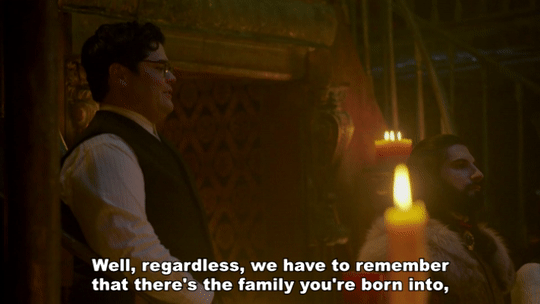
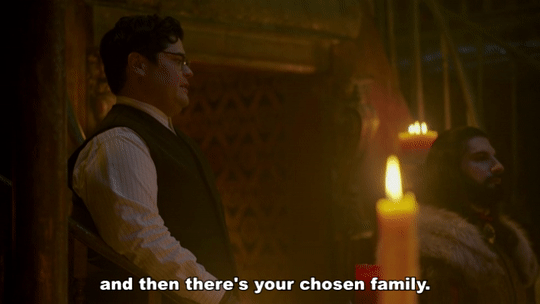


What We Do In The Shadows FX - S3E10 - The Portrait
1K notes
·
View notes
Photo

at Pankow, Berlin, Germany https://www.instagram.com/p/CZZetwSq9js/?utm_medium=tumblr
5 notes
·
View notes
Text
"I didn't carry u in my stomach for 9 months just for you to be suicidal 😡😡😡"
Tf you want me to do, give u a refund?
#depressing shit#suicide prevention#ed ftm#ftm ed#gay ftm#borderline pd#schizotypal#autistic#did/osdd memes#npd#hpd#bpd tag#aspd tag
404 notes
·
View notes